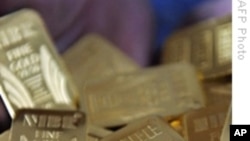<!-- IMAGE -->
India has purchased 200 tons of gold from the International Monetary Fund to diversify its foreign exchange reserves. From New Delhi, Anjana Pasricha reports the deal means that India's Central bank now has the tenth largest gold holdings in the world.
Few had expected India's Reserve Bank to be the first to buy the International Monetary Fund's gold.
India has snapped up 200 metric tons of gold - nearly half the precious metal the IMF is selling to shore up its finances and increase lending to developing countries.
The Reserve Bank has paid $6.7 billion for the gold.
The addition of 200 tons of gold means that about six percent of the Reserve Bank's foreign exchange reserves are now in gold, up from four percent. The country's foreign exchange reserves totaled $285 billion in October.
India's Finance Minister, Pranab Mukherjee, says the country's comfortable foreign exchange reserves prompted the Reserve Bank or RBI to invest in the precious metal.
"Naturally as a finance minister my advise to the governor of RBI would be that if you are in a position keeping in view the availability of the foreign exchange you buy that [gold], and from that perspective it has been bought," he said.
Economists say India has bought gold to diversify its assets and hold fewer dollars at a time when the U.S. currency is weakening against other currencies. Gold, whose prices have surged in the past year, is seen as a hedge against a slumping dollar.
India, like several Asian countries, holds relatively little gold in proportion to its foreign exchange reserves.
India's move to buy gold from the IMF is also seen as part of an effort to assert its greater role in world economic affairs. India, along with China, has been lobbying for larger representation in the IMF, and has promised to augment its resources for lending to developing countries.
There is speculation that other Central Banks, including the China's, would buy the rest of the gold the IMF plans to sell.
In fact, India's gold purchase is reminiscent of another year when the yellow metal dominated headlines in the country. In 1991, dwindling foreign exchange reserves forced New Delhi to use its gold reserves to raise a loan to pay its international debt. The payment crisis marked a turning point for India's economy as it prompted the government to reverse decades of closed-door, socialist style economic policies.
Economists say India's purchase of 200 tons of gold shows that the country has come a long way in the two decades since it was on the verge of defaulting on its international debt.
India is Asia's third largest economy, and it was less affected by the global financial crisis compared to Western countries.





